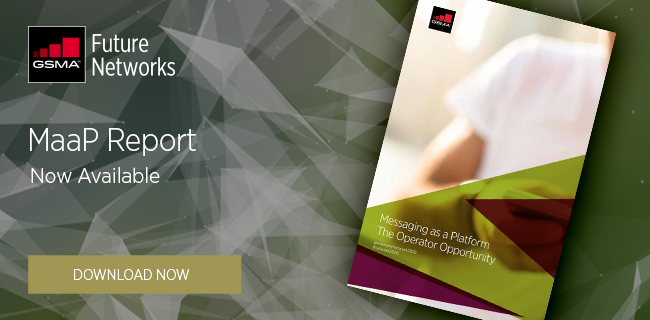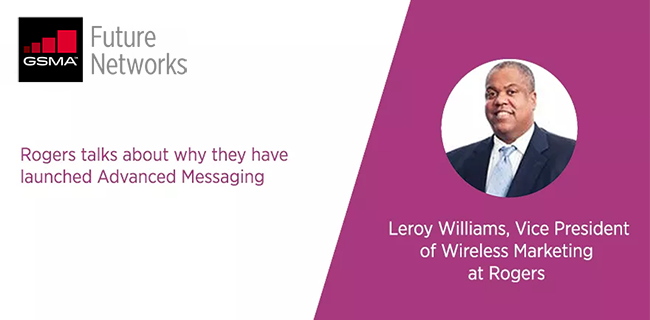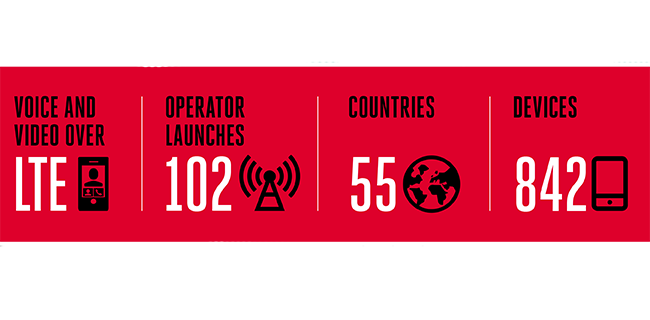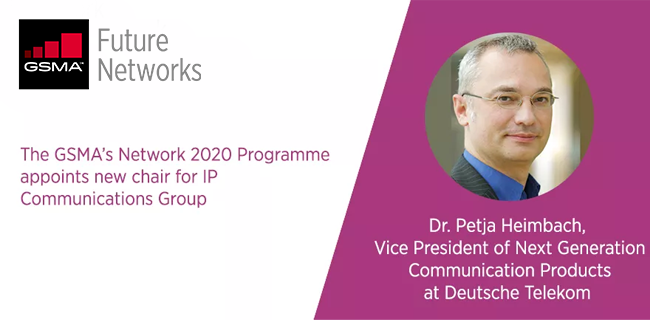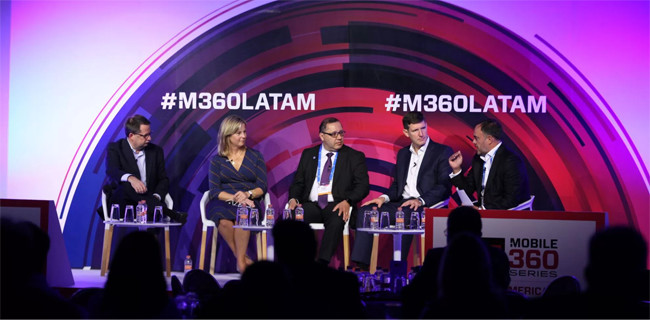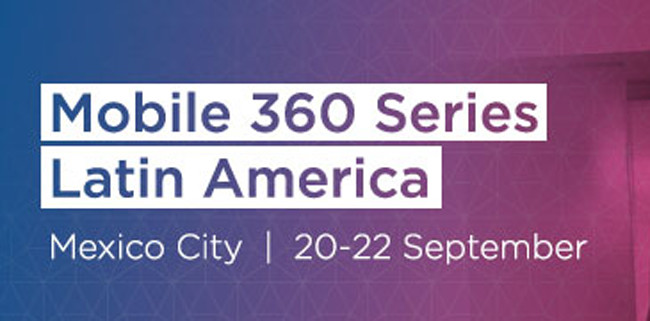






More Information
RCS Business Messaging provides brands with the opportunity to increase their engagement with customers by making use of business feature-rich mobile messaging using chatbots and artificial intelligence (AI).
User adoption is simple and straightforward. There is no need to download multiple apps as users gain direct access to a range of brands and services from within the messaging app itself, allowing them to engage with virtual assistants to book flights, buy clothes, make restaurant reservations and more.
Frequently Asked Questions
Does interoperability limit the scope of operator differentiation?
No. SMS and MMS are good examples of successful service enablers that have thrived based on interoperability while encouraging a proliferation of differentiated value-added services. RCS provides core functionality, enabling app development and differentiation, based on underlying interoperability and compatibility, such as instant messaging. Interoperability ensures that core RCS service features will operate seamlessly between users, whichever operator they belong to and whatever mobile phone they have.
How do you create a unique proposition for end-users?
The compelling strapline for RCS is: ‘It’s just there, and it just works’. RCS gives end-users the immediate opportunity to communicate with others in a variety of ways, without requiring installation, registration, etc. Furthermore, Rich Communications Services (RCS) boasts levels of security and QoS that only operators can provide and there will be no ‘closed community’ limitations. In other words, RCS will be available to all mobile operator subscribers, independent of handset and users will be made aware of an address book contact’s service capability. RCS provides end-users with a frictionless and trustworthy experience across networks and borders. Only mobile operators are capable of delivering such a service, and it is what today’s end-users have come to expect.
What infrastructure will operators need to deploy to take advantage of RCS?
RCS services are based on the IP-Multimedia Subsystem (IMS), as specified by the 3GPP and adopted by major industry standardisation bodies for mobile and fixed networks. Operators may implement their own IMS solution or can access the services of a hosted solution to provide a pre-IMS or partial-IMS implementation. The hosted solution may be a temporary or permanent solution for the operator.
Will RCS interconnect to Online Service Provider (OSP) apps such as Facebook Chat for example?
Example demonstrations from several vendors have shown that it is technically possible to achieve integrations between RCS and OSP apps. Such interconnects will be dependent on commercial agreements between operators and OSPs and will be based on similar terms and conditions as interconnect between RCS operators.
Can the RCS client be put on fixed devices such as IMS-registered IP phones and will these interwork with the mobile RCS clients?
An RCS client could be developed to work on IMS-registered IP phones and interworking would be possible if the networks are interconnected.
Aren’t the features of RCS inferior to Online Service Provider (OSP) app alternatives? How should operators position themselves to compete with them?
On the contrary, the current feature set, e.g. one-to-one and group chat, image and file-sharing of RCS, is competitive with most OSP services. Furthermore, RCS also offers the unique benefits of providing video, image and file share in-call, so that users do not have to switch apps to access these services. RCS also offers service capability discovery, which means that the user can be confident that if they see that a service is available, they can be sure that it will work. Operators can position their RCS services as easy to discover, install, set up and use and can offer a secure, reliable and private user experience.
Since WhatsApp, Viber, Line services etc. are already presented as IP-based apps, what is the added value of RCS?
The critical differentiator for RCS is that when natively integrated into the mobile phone or via a downloadable app, no intervention is needed by the end-user – ‘it’s just there’. Furthermore, only relevant and available services are offered to the user thanks to dynamic capability discovery – ‘it just works’.
What opportunities does an RCS deployment offer an operator?
The opportunity for the operator is to retain its relevance as the primary provider of personal communications services to its customers and reinvigorate its core communications products, by innovating and differentiating versus online service providers with ease of use, ubiquity, interoperability and privacy. New revenue-generating services can be developed on the RCS platform and will be discoverable in the right place, in the proper context.
How can operators monetise RCS-based services? Additional fees or data charging?
There are many ways in which RCS based services can be monetised: charging customers per event for certain services, bundling services into daily, weekly or monthly subscription packages or charging explicitly for data volumes consumed. In some cases, third-party service providers could be charged for the use of Rich Communications capabilities, e.g. video share or file share in the delivery of their specific services, such as in gaming apps or to enrich customer care services.
For an operator with strong on-net effect, Online Service Providers (OSPs) are not currently a significant threat and SMS price is already low, does it make sense to launch RCS at this moment? If they do so, isn’t this anticipating the loss of on-net effect?
RCS offers significant opportunities to enrich the consumer’s communications experience now, encouraging them to communicate more and helping to strengthen the mobile operator’s relationship with them. Maintaining the mobile operators’ relevance as the primary provider of communication services will become even more critical as competition shifts from the messaging market to the far more valuable voice market.
With the availability of high bandwidth, low latency, LTE networks, many more third parties could offer even more competitive mobile VoIP services. Operators need to act now to prepare themselves to compete with third-party service providers effectively.
What are the costs and timescales to implement RCS?
These are dependent on many factors, in particular, the current size and status of the operator’s network. For full deployment, there are a variety of architectural options that can be employed to achieve RCS deployment without significant upfront investments or complex network integrations.
Deployment of the first commercial RCS networks took less than nine months, with RCS Solutions taking as little as three months.
We can now confirm, given the ecosystem experience and knowledge acquired during these initial deployments, that future implementations have been much faster:
- LATAM region implemented six-country launches within five months with a hosted solution.
- Sprint, the second USA operator to launch RCS services, was live with a hosted solution within 12 weeks.
What is the market demand for this product? How will RCS compete with Online Service Providers (OSPs)?
The popularity of several OSP services best demonstrates the market demand. With the advent of all-IP networks and greater penetration of smartphones, demand for Richer Communications will grow. Yet, only operators can deliver quality, secure services whose scope is not
limited to a specific OEM or OS universe. Complementing this will be service capability, which will guarantee that end-users will not have a “trial and error” experience when attempting to communicate with address book contacts.
Who is the target audience for RCS?
Consumers who wish to stay in touch with friends and family, and capture and exchange rich media with them as events happen. The youth demographic is particularly attracted to the RCS proposition; and Business users who need to exchange multimedia documents and work collaboratively with colleagues.
How can the Future Networks team assist operators in deciding to commit to RCS?
Both operator and the GSMA’s members of the Future Networks team welcome the opportunity to assist other operators in their efforts to decide to commit to RCS. Through documentation, content, face-to-face sessions, workshops, C-level briefings, live demos and other methods, the Future Networks team is ready to inform and convince.
Operators considering RCS should not hesitate to contact the Future Networks team, and we look forward to working with you.
RCS Business Messaging is an opportunity for operators to reshape and revitalise their messaging services and play a central role in the future of IP-based messaging.
RCS Business Messaging provides the opportunity for operators to grow revenue by enhancing their business to offer new capabilities and share in the revenue generated by new business paradigms such as AI, chatbots and in-chat search.
The following nine principles are essential to ensure trust in RCS Business Messaging and secure its place as the communications platform of choice.
- Openness
- Innovation
- Reach
- Quality
- Protection
- Reward
- Value
- Transparency
- Privacy
You might also like
Why MaaP can help mobile operators own the conversation
Sunday 26 February, 2017 | Digest | Latest News | RCS Digest
Conversational commerce – where interactions take place at the intersection of messaging apps and shopping for goods or services and suppliers can engage customers in entirely new ways across multiple channels – is set to revolutionize customer experience. It is being ...
SMS reinvents itself with RCS, 5G and 4G connected street furniture to be showcased at the GSMA Innovation City
Tuesday 21 February, 2017 | 5G Digest | Digest | Latest News | RCS Digest
Mobile networks are undergoing the most fundamental transformation in a generation. Advanced Messaging through RCS and an emerging 5G have the potential to enable services which vastly improve the customer experience and support the rise of new technologies. Significant ...
Telenor launches Advanced Messaging across Europe and Asia
Thursday 16 February, 2017 | Digest | Latest News | RCS Digest
Telenor have announced that they will enable the launch of RCS messaging services to their 211 million subscribers across Europe and Asia. They will join Rogers and Sprint in being amongst the first operators to launch the service which is based on the GSMA’s Universal ...
Next Generation Mobile Networks will be the Centerpiece of Mobile World Congress 2017
Monday 6 February, 2017 | 5G Digest | Digest | Latest News | RCS Digest
For some time, All-IP Communications and 5G have been two of the most widely discussed and anticipated technologies in the mobile industry. Following a year of significant progress in both fields, the industry is now in a position to unveil the latest capabilities and ...
Rogers talks about why they have launched Advanced Messaging
Tuesday 24 January, 2017 | Digest | Latest News | RCS Digest
Rogers became the first mobile operator in Canada and the second in the world to launch Advanced Messaging services to its subscribers based on the GSMA’s Universal Profile. Through a partnership with Google, Rogers will offer enhanced messaging experiences and access to ...
Trends and Analysis: Global Interconnections Gain Momentum
Tuesday 24 January, 2017 | Digest | Latest News | RCS Digest | Volte Digest
By Henry Calvert, Head of Network 2020 programme, GSMA. Since our last update we’ve seen a number of significant developments in the adoption of all-IP communications services by the global operator community such as Voice-over-LTE (VoLTE), Voice-over-Wi-Fi (VoWiFi) ...
The GSMA’s Network 2020 Programme appoints new chair for IP Communications Group
Tuesday 24 January, 2017 | Digest | Latest News | RCS Digest
Dr. Petja Heimbach, Vice President of Next Generation Communication Products at Deutsche Telekom (DT) has been appointed Chair of the GSMA’s IP Communications Leadership Team following the resignation of Kobus Smit from his position as Head of Voice and Messaging at DT. ...
Sprint talk about the benefits of launching Advanced Messaging
Thursday 12 January, 2017 | Digest | Latest News | RCS Digest
An Interview with Ryan Sullivan, VP, Product Development, Sprint. Sprint has become first to partner with Google and deploy the GSMA’s Universal Profile for Advanced Messaging. The profile, which is backed by 58 global operators, OEMs and OS providers, upgrades existing ...
Enabling Advanced Communications Everywhere
Tuesday 3 January, 2017 | Digest | Latest News | RCS Digest
Kobus Smit, Head of Voice & Messaging Products for Deutsche Telekom, explains how the rollout of consistent advanced messaging services will transform the mobile industry Mobile messaging is undergoing a global upgrade. Approximately 50 mobile operators around the world ...
Rogers launches Advanced Messaging services in Canada
Wednesday 14 December, 2016 | Digest | Latest News | RCS Digest
Rogers became the first mobile operator in Canada and the second in the world to launch Advanced Messaging services to its subscribers based on the GSMA’s Universal Profile. Through a partnership with Google, Rogers will offer enhanced messaging experiences and access to ...
Slovakia: the Latest Country to go All-IP
Monday 12 December, 2016 | Digest | Latest News | RCS Digest
December 6th saw the launch of interconnected Advanced Communications in Slovakia. Following coordination and testing by the GSMA, SlovakTelecom and Orange Slovensko are the latest operators to press ahead with all-IP interconnection which, under the auspices of the GSMA’s ...
GSMA Universal Profile for Advanced Messaging now available
Friday 18 November, 2016 | Digest | Latest News | RCS Digest
We first announced that we were working to develop a Universal Profile for Advanced Messaging back in February at Mobile World Congress in Barcelona. Now, just 10 months later, we have published the first release of the Universal Profile for Advanced Messaging, which will ...
First Launch of Universal Profile for Advanced Messaging
Friday 4 November, 2016 | Digest | Latest News | RCS Digest
Sprint Becomes First Operator to Launch Service with Google; GSMA’s Universal Profile Now Backed by 58 Global Operators and Manufacturers London: The GSMA welcomes today’s announcement by Google and mobile operator Sprint that Sprint has become first to partner with Google ...
GSMA WELCOMES FIRST LAUNCH OF UNIVERSAL PROFILE FOR ADVANCED MESSAGING
Friday 4 November, 2016 | Digest | Latest News | Press Release | Press Releases | RCS Digest
Sprint Becomes First Operator to Launch Service with Google; GSMA’s Universal Profile Now Backed by 58 Global Operators and Manufacturers London: The GSMA welcomes today’s announcement by Google and mobile operator Sprint that Sprint has become first to partner with Google ...
How mobile is changing commerce in our phono sapien world
Tuesday 25 October, 2016 | Digest | Latest News | RCS Digest
By Oisin Lunny In 2016 we live in a mobile-first world, populated by what The Economist termed a new species of “phono sapiens”. We are glued to our mobile devices most of the time, and use these portable super-computers for so many sophisticated and essential interactions ...
Universal Profile launch date announced
Thursday 6 October, 2016 | Digest | Latest News | RCS Digest
By Jill Cooper, Marketing Director, GSMA The GSMA’s Universal Profile for Advanced messaging gets launch date. The GSMA’s Network 2020 programme has been working closely with leading operators, OEMs and operating system providers on the development of its Universal ...
Trends and Analysis: All-IP Solutions Gaining Global Momentum
Wednesday 5 October, 2016 | Digest | Latest News | RCS Digest
Henry Calvert, Head of Network 2020 programme, GSMA We are seeing real momentum in the global deployment and adoption of all-IP communications services by the mobile operator community such as Voice-over-LTE (VoLTE), Voice-over-Wi-Fi (VoWiFi) as well as the Universal ...
Why Operators Should Deploy Advanced Communications
Wednesday 5 October, 2016 | Digest | Latest News | RCS Digest
By David O’Byrne, Project Director, GSMA The strategic importance of IP technology to enable advanced communications services for mobile operators Mobile communications have become essential to modern life. Around the world, there are 6.7 billion mobile phones, connected to ...
Google teases plans to take RCS to the “next level”
Friday 30 September, 2016 | Digest | Latest News | RCS Digest
By Steve Costello LIVE FROM GSMA MOBILE 360 LATIN AMERICA, MEXICO: Google’s Todd Parker talked up the evolution of RCS (Rich Communications Services) to capitalise on the mobile messaging boom, with several other execs highlighting the potential the technology offers. RCS ...
Network 2020 at Mobile 360 Latin America
Wednesday 21 September, 2016 | 5G Digest | Digest | Latest News | RCS Digest
By Jill Cooper, Marketing Director, GSMA The region’s transition to the world of advanced communications was explored at this year’s Mobile 360 – Latin America, which took place in Mexico City 20-22 September 2016. The three-day event hosted many of the continent’s ...


